March 12, 2024: Saket Gokhale, a member of Trinamool Congress, claimed that the government is collecting information and data from new voters in an illegal way. They are doing this through a campaign called “Mera Pehla Vote Desh Ke Liye” (My first vote for the country).
Is It Wrong for MyGov to Ask for Bank Details from First-Time Voters ?
The short answer is yes. While MyGov may have legitimate reasons for wanting to ensure that DBT payments are made to the correct recipients, asking for bank details is a risky practice that could have serious consequences for participants. In an age where data breaches and online scams are increasingly common, it is essential that organizations take every precaution to protect the personal information of their users.
Additionally, there is no guarantee that the bank details provided to MyGov will be handled securely and responsibly. Without proper safeguards in place, this information could potentially be accessed by malicious actors and used for nefarious purposes. As such, it is understandable why many people are hesitant to provide such sensitive information to a government-run platform like MyGov.
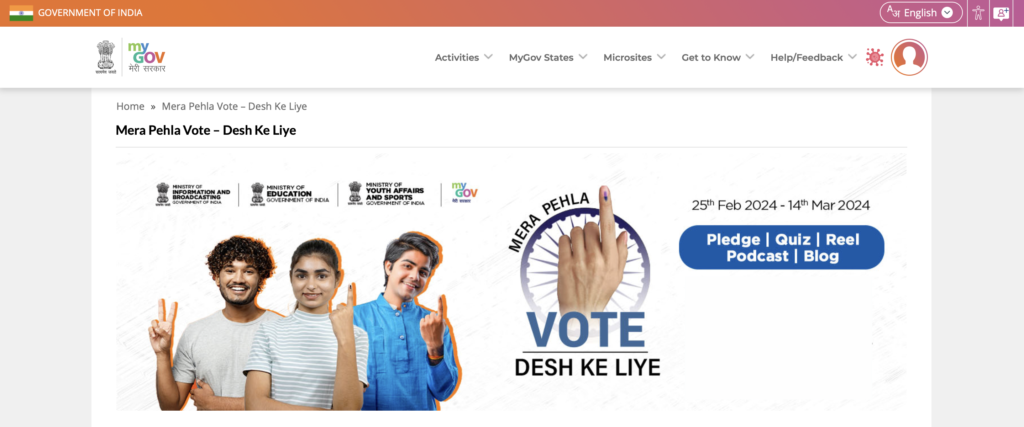
Related Article:
Are governments aware that voters’ consent should not be asked when it comes to availing bank information? This issue raises concerns about privacy, trust, and the boundaries that should exist between citizens and their government. In this article, we will deeper into why governments should refrain from requesting consent from first-time voters for such personal information.
Mygov was launched by the Government of India in 2014 as a platform for citizens to participate in governance by sharing their ideas, suggestions, and feedback. Over the years, it has evolved into a one-stop solution for all government-related activities, including competitions and contests.
27 FEB 2024 : https://pib.gov.in/PressReleaseIframePage.aspx?PRID=2009406
Mygov started giving cash prizes to winners of its contests and competitions as a way to incentivize participation and reward excellence. This move was aimed at encouraging more people to actively engage with the platform and share their ideas on various government initiatives. While this initiative was well-received initially, it later raised some eyebrows when the process changed to Direct Benefit Transfer (DBT) for distributing the cash prizes.
The shift to DBT for distributing cash prizes raised concerns among participants regarding the safety and privacy of their bank details. Asking for bank details from participants can be a red flag as it may expose them to potential risks such as identity theft, fraud, and unauthorized access to their financial information. Participants should exercise caution when sharing sensitive information such as bank details, and organizations like Mygov should explore alternative methods for disbursing prizes without compromising participants’ privacy and security
Providing bank information for the “Mera Pehla Vote Desh Ke Liye” campaign raises serious concerns about the security and integrity of voter data. While the government claims that the information is being collected for verification purposes, many leaders warn against sharing such sensitive information without proper safeguards in place. It is crucial for individuals to exercise caution and ensure that their data is protected from any misuse.
When first-time voters accessed the Mygov website to input their bank information, they were prompted to click on a submit button to give consent. However, there was no option given to submit the information without consent. This lack of choice raised concerns among users about whether their data was being securely handled and if they had the autonomy to decide how their information was used.

The Trinamool Congress MP Saket Gokhale alleged that the Union government’s campaign called “Mera Pehla Vote Desh Ke Liye” (My first vote for the country) is illegally harvesting personal information and data of first-time voters. The campaign aimed at election awareness for new voters is being conducted on the MyGov website and seeks details like name, gender, date of birth, pin code, state, district, email, and mobile number from the participants. Gokhale questioned why bank account details are being collected from all participants and not just the winners of the quiz contest conducted as part of the campaign. He said this amounted to voter data harvesting by the ruling BJP and allows targeted propaganda ahead of upcoming Lok Sabha elections.
TNM visited https://www.mygov.in/mera-pehla-vote/ website and found out the following:
- The campaign offers five activities: Take a pledge, quiz on India’s democracy, reel making contest, create a podcast, and blog-writing.
2. Under the ‘Mera Pehla Vote, Desh Ke Liye pledge’ , the website seeks details of the applicant such as name, gender, date of birth, pin code, state, district, email and mobile number.
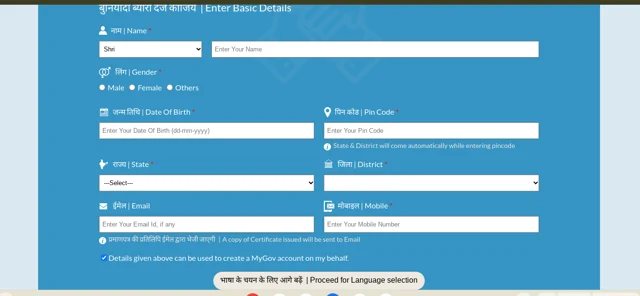
3. Once the details are submitted, the website asks the applicant to select a language to read the pledge.
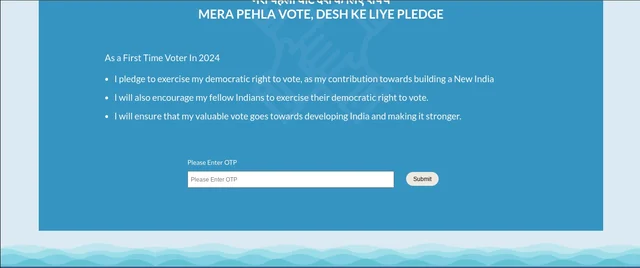
4. In order to confirm that the applicant has read the pledge, an OTP will be sent to the registered mobile number. Then the certificate of the pledge will be given.
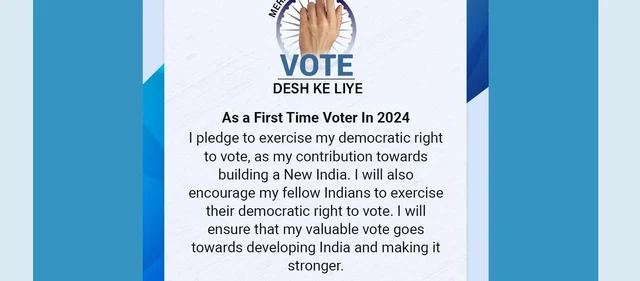
5. Under the ‘Quiz on India’s democracy,’ the applicant has to sign up on the website. The applicant also has to submit their residential address as per government records. After 10 questions are answered within 5 minutes, the site has an option to add bank account details, including account number and IFSC code. This however is not mandatory and is for people who want to avail the prize. The website says that 18 selected people will get Rs 5000 as a prize.
Shocking & very concerning:
— Saket Gokhale (@SaketGokhale) March 12, 2024
How the Modi Govt is ILLEGALLY harvesting information & data of first-time voters to help BJP target them
In a brazen move, the Modi Govt is illegally collecting data of first-time voters to target them for the upcoming elections using state… pic.twitter.com/RGXruTZdMv
Addtional Information:
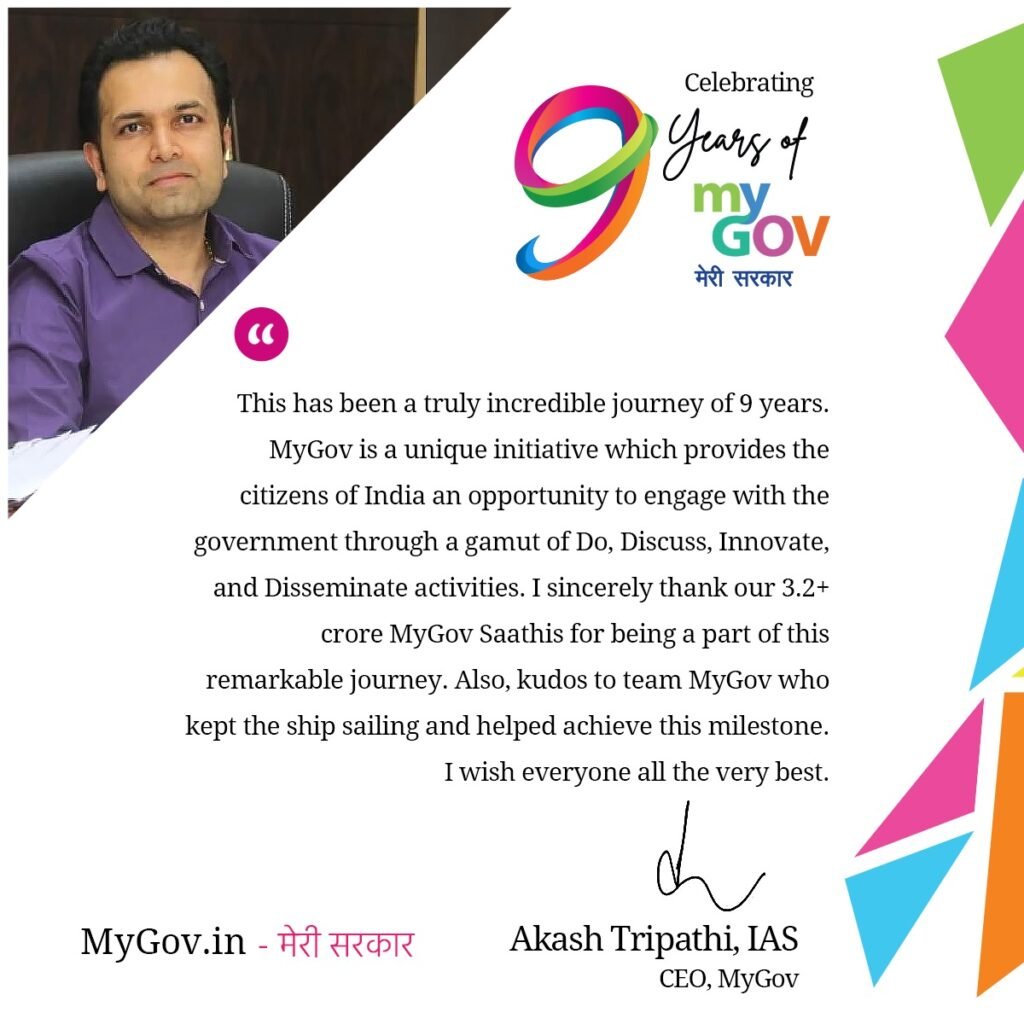
MyGov chief Akash Tripathi set to become new CEO of India Semiconductor Mission

Oct 02, 2023: Akash Tripathi, who currently serves as the chief executive of MyGov, has been appointed as the new CEO of India Semiconductor Mission. He will replace the current CEO, joint secretary Amitesh Kumar Sinha, whose tenure is ending on October 4. The India Semiconductor Mission was launched in December 2021 to establish a semiconductor manufacturing ecosystem in India and has received $10 billion in funding. As the new CEO, one of Tripathi’s important mandates will be to screen applications for subsidies under the semiconductor mission.
Tripathi’s duties at present include overseeing website and social media activities, artificial intelligence and emerging technology, the Human Centred Computing division, India AI, and the Digital India Bhashini Division.
Meta has partnered with the Ministry of Electronics and Information Technology (MeitY) in India to launch a ‘G20 Stay Safe Online’ campaign as part of India’s presidency of G20. As part of this partnership, Meta will create and share helpful online safety resources in multiple Indian languages through various online channels.
Under the mission, the government on September 23 broke ground for a $2.75 billion Micron semiconductor assembly, testing, marking, and packaging (ATMP) plant in Sanand, Gujarat. The project is expected to bring in more progress in the semiconductor mission, with two big proposals already underway, union minister Ashwini Vaishnaw had said.
Source: The News Minute,Twitter, PIB Gov, Medianews4u, ET, Mygov-Image
Also Read:
